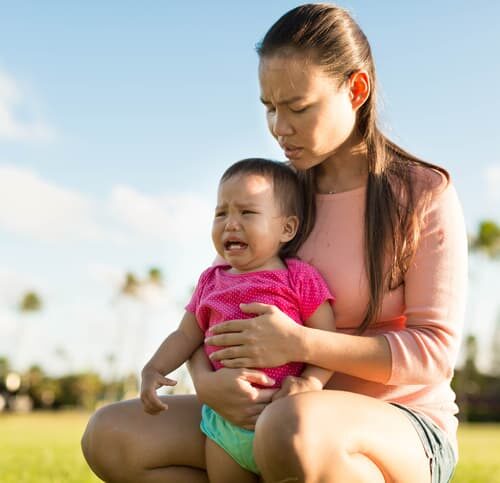The Expectation Gap: When Do Toddlers Have Control Over their Behaviors?
- April 12th, 2018
- No comments yet
- Blog

*Updated June 2021
Toddlers are wildly and wonderfully unpredictable. One minute, your little girl might be happily conversing with you, and the next, she’s out of control, rolling on the floor in agony because she can’t have that cupcake she just spotted on a TV commercial. For parents, this seemingly unpredictable lack of emotional control can be exasperating — unless, that is, you’re expecting it.
One reason parents can feel so frustrated about toddler’s behavior is the “expectation gap.” Many parents assume that tots are capable — or should be capable — of doing things that their brains simply aren’t ready to do yet.
A major survey by the Zero to Three Foundation, the world’s largest organization dedicated to infant and toddler well-being, revealed that 56 percent of parents believe that children have the impulse control to resist the desire to do something forbidden before age 3. And 36 percent believe that children under age 2 can do so. The truth: toddlers don’t start developing these abilities reliably until age 3-1/2 or 4 at the earliest.
The same survey found that 43 percent of parents think children can reliably share and take turns with other children before age 2. In reality, this skill develops between 3 to 4 years as well.
If you’re skeptical of these results, you might wonder why your toddler can sometimes successfully manage a situation, but at other times behave poorly in identical circumstances. Doesn’t this mean that the child is purposefully choosing to misbehave?
The short answer is no. Toddlers’ behavior is so unpredictable because attaining the capacity to control one’s emotions and actions depends on a mix of the child’s brain development and her body’s state at any given moment. All of these factors influence the child’s ability to control behavior:
* Rapid brain growth with neural circuits in flux
* Sleep requirements not being met
* Hunger, or fluctuating blood sugar levels (known as being “hangry”)
* One’s subconscious sense of safety—which can depend on the environment and relationships
* Body states, including pain from teething, an incubating virus, or overreactivity to sounds or other sensory input
* The expected ups and downs of social and emotional growth
In other words, its complex! So, the next time you’re at wit’s end over something your toddler did, remember that your child’s abilities are still emerging. Indeed, we develop the ability for emotional and behavioral control into early adulthood. Being inconsistent is to be expected. One day your son might handle a disappointment or limit calmly, but the next day (or hour) the very same challenge will trigger a tantrum. It’s all part of the way we develop as human beings.
So, what can you do as a parent when your toddler acts unpredictably and you’re not sure how to react?
- Ask yourself if the child’s ability to control his behavior is fully developed yet. If your child is younger than 5 years old, this ability will be very inconsistent, so it’s important to meet the behavior with compassion and loving limits. All children, regardless of age, are vulnerable to losing emotional control, especially during times of stress in the community or world (such as a pandemic).
- The best way to help an out-of-control child is for us to stay calm. This process of assisting a child in calming down by sharing our own calmness is known as emotional co-regulation.
- In order to give children what they need, we need to acknowledge how much we have in our own emotional tanks, and take care of ourselves. That way, we’re more likely to have the energy and presence to support our children successfully.
Remember, children feel growing pains in more than just their bones and muscles. These discomforts also emerge from the way small human beings reconcile living in an unpredictable world. By understanding that toddlers naturally have uneven coping abilities, we can narrow the expectation gap, and reduce our children’s stress — and our own. In the process, we’ll strengthen our precious, lifelong relationships with our children.
I share more about how children develop resilience and coping in the new book, Brain Body Parenting and Beyond Behaviors: Using Brain Science and Compassion to Understand and Solve Children’s Behavioral Challenges
Join our email list on the bottom of the page for infrequent and exciting updates about the upcoming Brain-Body Parenting Collective!
